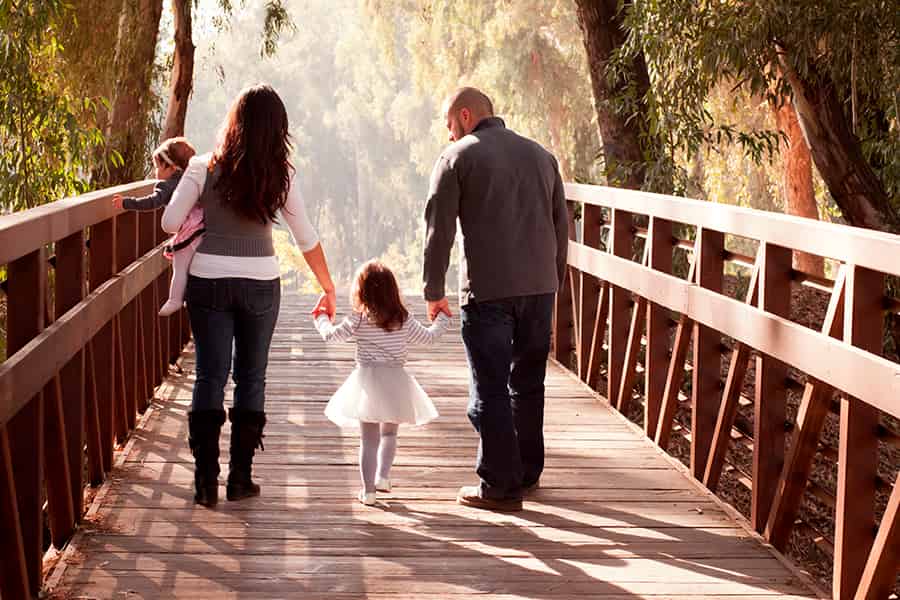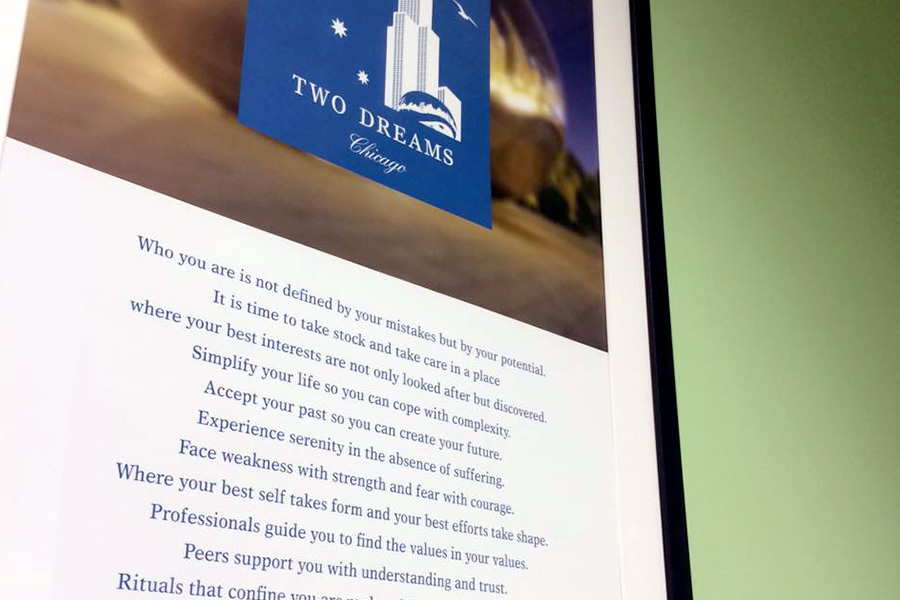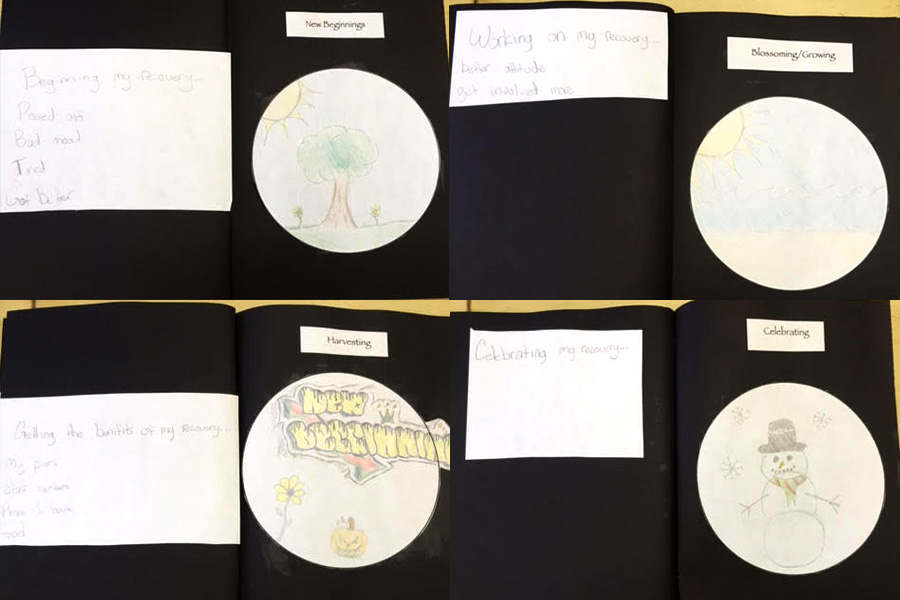Dream Journal
 Note From Dr B.
Note From Dr B.
In 2011, researchers from Case Western Reserve University published an article in Alcoholism Treatment Quarterly indicating that volunteer work and service to others are integral to the recovery process. This finding is consistent with the stated purpose of Alcoholics Anonymous, to stay sober and help others achieve sobriety as well.
At Two Dreams, clients embrace the power of service to themselves and others through regular group therapy sessions. Clients help each other process their emotions and provide feedback on their progress in their recovery. We encourage clients to keep in touch after leaving the facility and we stress the importance of open communication in the milieu. We find that clients are able to build deep relationships with each other based upon their common experiences, and they are therefore able to help each other through difficult challenges and emotions that come along with addiction. Helping others at different stages of treatment also reminds clients of where they have been or where they aim to go in terms of recovery. This enforces a commitment to combatting the addiction and increases the determination needed to succeed.
During this holiday season, it is especially important for us to remember that giving should not be followed by the expectation of receiving. Give of yourself freely because you can make the world a better place.
Happy Holidays and Happy New Year,
Dr. B
Sources cited:
https://www.sciencedaily.com/releases/2011/01/110128104242.htm
http://alcoholrehab.com/addiction-recovery/service-in-recovery/
Theme Analysis: Service

“Practical experience shows that nothing will so much insure immunity from drinking as intensive work with other alcoholics. It works when other activities fail. This is our twelfth suggestion: Carry this message to other alcoholics! You can help when no one else can. You can secure their confidence when others fail. Remember they are very ill.
Life will take on new meaning. To watch people recover, to see them help others, to watch loneliness vanish, to see a fellowship grow up about you, to have a host of friends – this is an experience you must not miss. We know you will not want to miss it. Frequent contact with newcomers and with each other is the bright spot of our lives.”
— Big Book, Working with Others
Similar to the way that all major religions share similar, strong stances regarding the kind and gentle way people should treat others, all of the different paths of recovery I have encountered have stressed the importance and benefit of service.
When times are hard, get outside of yourself and serve. When you are blessed and grateful, pay it forward and be of service. No matter the circumstance, there is always a good reason to give back. In return, caring for others always seems to rejuvenate and refill our own self-esteem and happiness.
Abstinence sustained for a long period of time, simply put, can be difficult. We can find ourselves feeling satisfied with our progress, maybe even quite pleased with ourselves, which can put us in a position where the need to make that next meeting or do that next right thing isn’t feeling quite as dire as it once did. This place, as we all know, can be a dangerous and potentially volatile space to dwell. I have found that in these instances, it is Service that can keep us motivated to stay the course. It is taking those gifts that were given to us and passing them along. It is encouraging words over a cup of coffee, sharing our perseverance at a meeting full of young sobriety, and/or jumping into the trenches on a 12 step call to someone needing a lifeline. It is service at its truest and most basic form: volunteering for a service role at a meeting. Service will positively contribute to our evolution and is guaranteed to contribute to the recovery of many others.
The holidays can be increasingly difficult on individuals that are either estranged from family or simply do not have family or any other sense of community near them. Be of service to these souls. And, if you are reading this and feel like you are someone who feels that lack of community and family in these times of gathering and celebration, I encourage you to do two things:
1. Reach out. You are special and valuable and important, so allow someone to be of service to you.
2. Be of service. It works.
Happy Holidays,
Aaron Domingue
Client Artwork
Art therapy can have a huge impact on addiction recovery, as clients keep their hands and minds busy. The repetitive motions of many art forms, along with the quiet solitude in which clients can surround themselves while working, are considered to be quite soothing. When focusing on the process of self-expression through art, clients become calm and relaxed, allowing them to stay focused on healing instead of the detriments of addiction. That calm feeling works to reduce stress, depression, and anxiety.
Service is one of the most important AA legacies and our clients perceive it in very individualized ways. It can be related to understanding their own identity in recovery, the impact that offering help may have on their internal states, or taking the time to listen to the other person’s concerns. In their words: “Service is an ultimate mission in recovery.”


News Highlights
What The Controversial 21st Century Cures Act Means For You
In early December, President Obama signed into law the 21st Century Cures Act. Part of this Act designates $1 billion over two years to combat the opioid epidemic, which will specifically go towards state efforts such as training, research, and making treatment programs more accessible. The Act also additionally addresses mental health needs by providing grants, requiring insurance companies to treat mental health treatment like medical treatment, etc.
Drug overdose deaths increased significantly in past 5 years
The Center for Disease Control and Prevention reports that drug overdose deaths in the United States have increased by 33% in the past five years…and the opioid crisis is largely to blame. Prescription painkillers seem to be taking the highest toll on the general public, and synthetic opioid deaths are on the rise. Some states have seen death rate increases as high as 200%, and epidemiologists are hoping to quell these surges as soon as possible.
Featured Staff Member Questions: Renina Varfaj
 Q. What is your current position and job description?
Q. What is your current position and job description?
A: I am currently a therapist for our Outer Banks facility. I provide addiction counseling and support through individual, group and family therapy sessions.
Q. Where did you work before Two Dreams and what did you do?
A: Before working at Two Dreams I worked as a Human Service Professional with Seacoast Youth Academy, a Group Care Level III facility, and as a therapist with “SCYAP” in South Carolina. My jobs included providing individual and family therapy to juvenile clients and their families who were struggling with socio-psychological and financial issues.
Q. What has your journey been like at Two Dreams?
A: I have felt very welcomed and supported during my journey. I enjoy being witness to the fact that very different personalities can come together and dedicate their work to a common cause: to see each client in recovery fulfill their potential as a human being. I see my job with TDOB as an important part of my personal and professional growth.
Q. What made you get into this profession?
A: During my teenage years I had the opportunity to study different subjects connected to psychology, sociology and philosophy. I was fascinated right away and knew from there what my professional identity would be. Since then, most of the activities have been connected to therapy and professional growth. I am a firm believer of the fact that therapy is just not a profession, but a lifestyle.
Q. What is the most gratifying part of your job?
A: Getting to see the transformation in people through their intensive work. It always amazes me what the healing power within can bring to an individual.
Q. What do you like about the Two Dreams program?
A: I really enjoy working in a setting where the vision and the philosophy of treatment are applied professionally. Other elements I like include the individualization of treatment according to client needs and team collaboration on client care.
Q. Where did you go to college and post-grad and what did you study?
A: I graduated as a “Clinical Psychologist” in 2008 from University of Tirana, Albania. In 2012, I received a “Master in Research in Education” degree from University of Tirana, Albania. In April 2014, I received the title “Psychodrama Psychotherapist” from the Institute of Psychodrama and the title “Psychotherapist” from the European Association of Psychotherapy.
Q. How would others describe you? How does your personality complement the work you do?
A: On professional terms I’ve been considered a strong-willed and dedicated person. On a more personal level I am considered to be empathetic and reliable. I believe personal qualities shape each therapist’s style and can be assets during daily work with clients.
Q. What do you like to do when not at work? What are your favorite hobbies?
A: I enjoy spending time with my family, exploring new places, and reading. I am still very connected to my community in Albania, and actively participate in conference calls, mentor students in their research proposals, and communicate often with all my friends and colleagues back in Tirana.
3 P’s – December and January 2016
Physical Well-Being, Personal Productivity, Mental Peace

Theme: Service
Being of service is defined as the act of helping or doing work for someone else. Service can also be viewed as performing routine maintenance or repair work, which I like to think of as the maintenance and service of the self in terms of recovery. Being of service has a lot of benefits and is an essential part of being selfless. Helping others provides us with self-confidence and self-worth; it makes us feel good about making someone’s day or making someone happy. We can also be of service to ourselves, and it is important to note that we cannot help others if we cannot help ourselves first.
Being of service to our bodies means ensuring that we practice healthy eating and regular exercise. There are going to be times when we do not feel like eating salads or toning our bodies and there also may be times where we slip and revert back to old behaviors of eating and being lazy. During these times, it is important to pay special and close attention to ourselves and ensure that we get back to healthier patterns as soon as we recognize those old behaviors.
It is also important to note that by being of service to others and to ourselves we will develop the mental peace that we need to continue in our recovery process. This can mean attending meetings regularly and maybe arriving 15 minutes early to help set up the meeting, or being a reliable friend to someone in need.
We of course need to also make sure that we always take care of every aspect of ourselves as well. We need to take the time to ensure that we are being productive in our lives and doing things that are meaningful to us, making us feel accomplished and proud.
Physical Well-Being, Personal Productivity, Mental Peace
Theme: Service
“No matter how far down the scale we have gone, we will see how our experience can benefit others. That feeling of uselessness and self-pity will disappear. We will lose interest in selfish things and gain interest in our fellows. Self-seeking will slip away” (Alcoholics Anonymous, p.84).
This quote, taken from a popular passage known as the “9th Step Promises”, reflects a core indicator of recovery: the desire to be of service. A sure sign that a fundamental change is taking place for someone in recovery is the aspiration to help others. As recovery takes hold, we become more in tune with the vast need for service, and the many opportunities we have to be useful in a way that was lacking during active addiction; service provides a sense of purpose that was sorely missing. While the spiritual principle of service can be viewed as a fundamental of outcome recovery, it can also be used as a tool to bring gains in the areas of Physical Well-Being, Personal Productivity, and Mental Peace.
Our Physical Well-Being is neglected during active addiction. As we engage in recovery our awareness of self begins to change. Here we begin to apply the principle by of service by viewing exercise, healthy sleep patterns, and nutrition as gifts we can give to ourselves to improve our mood and sense of well-being. In recovery we move from a self-destructive phase to a physically nurturing one.
On the surface, one may have difficulty seeing how service and improved Personal Productivity are related. It’s common for people in early recovery to become overzealous in an honest effort to make up for lost time. Frequently people view service as an inconvenience when there are more pressing priorities. However those of us who have experienced its benefits know that service clears the mind, brings forth the powerful emotion of gratitude, and facilitates a greater focus that permeates all areas of our lives and enables us to be more productive.
Finally, there is a clear relationship between Mental Peace and service. There’s a wise saying in 12 Step programs, “You have to give it away to keep it.” The “give it away” part of the phrase is referring to being of service by helping our fellow members recover, and the “it” that we are able to keep is the Mental Peace or freedom from obsessive thoughts and negative emotions we experience in recovery. As we experience the benefits of recovery, and more specifically the outcomes of Physical Well-Being, Personal Productivity and Mental Peace, we are inspired to help others through service, which is not only a natural symptom of recovery, but also an important principle that will take our growth to new levels.
Outer Banks Community Update December
This month’s topic is service. While in treatment, clients attend 12-step meetings where they practice service work by helping fellow addict/alcoholics in recovery, setting up and cleaning up after meetings and more! At Two Dreams Outer Banks, clients are provided with an opportunity to work on building a solid sense of self and a new life of recovery so that they can eventually go out and get involved in the community to perform service work of their own through volunteering at a church, the 12-step fellowship, a homeless shelter, etc. The Two Dreams Outer Banks staff strives each day to set a positive example for our clients in terms of service work by doing the same types of things in their own lives in and outside of work. The service work opportunities are endless!
Throughout the day, clients keep busy by participating in process groups, art group, AA/NA meetings and the gym with hopes of developing healthy habits. It is important to have a sense of balance and fun in recovery as well and this is done in a number of ways at Two Dreams Outer Banks through their activities which have recently included enjoying the holiday lights at the Elizabethan Gardens, bowling, and attending the movies as well as the NC aquarium.
Outer Banks Community Update January
To bring in the New Year, it is important to take time and reflect on how AA started on the Outer Banks. In 1972, a man named Joe started a Big Book meeting on Thursdays at the Kitty Hawk United Methodist Church. Later that same year, a man named Tom started the Kitchen Table Group on Ocracoke Island; he also held the first AA Jamboree. In order to continue to grow, it is important to reflect upon how far the fellowship has come on the Outer Banks (and around the world). Today, the Outer Banks now holds at least two meetings a day, seven days per week!
Recently at Two Dreams Outer Banks, clients had the opportunity to attend the annual Outer Banks Alcathon. This event allows those in recovery to end the year with a celebration. Members of the fellowship gather together to socialize, eat, enjoy each other’s company, and listen to speakers share their journey in recovery stories.
Throughout the day, our clients are kept busy following a schedule of process groups, art group, AA/NA meetings, gym time, and other activities in order to develop new and healthy habits. It is important to have a sense of balance with fun in recovery as well. This is done in a number of ways at Two Dreams Outer Banks through their activities which have recently included bowling, attending the annual Alcathon, and visiting the historic Wright Memorial.
*Information source: http://aaobx.com/history.htm
Chicago Update December
Illinois legislators are preparing to instate many new laws regarding substance use and mental health in the New Year! Here are a few changes that you can expect to see come January:
HB 5593 Substance abuse programs licensed by DHS must provide educational info on opioid treatment options, including use of medication for opioid addiction and overdose, how to administer naloxone.
HB 5594 If defendant needs opioid abuse or addiction treatment, court shall require them to participate in prescribed drug treatments under care of licensed physician
SB 2601 Extends the time frame for the filing of a motion to vacate to 60 days after the discharge of probation once alcohol or drug treatment as a condition of probation has been completed
SB 0210 Bans the sale of “bath salts” and allows local gov’ts to revoke a retailer’s license if a violation occurs
HB 5781 Allows police officers and coroners to dispose unused meds found at the scene of death after consulting law enforcement investigating the death; medication shall be retained in the event an autopsy is performed for toxicological analysis purposes
SB 0320 Creates the Mental Health Opportunities for Youth Diversion Task Force
Chicago Update January
New year, new look! We redecorated the Chicago office to more appropriately convey the Two Dreams message of warmth, openness, and acceptance. For example, we redecorated the waiting room to create a more “roomy” feel by spreading out the chairs and tables. As a side note, you’ll notice that we have some sea foam green accent walls, which color psychologists recommend for doctor’s offices due to its benevolent, calming effect. We also created two new therapy rooms to prepare for our upcoming group therapy sessions that will be starting within the next few months. We added more plants and inspiring artwork to the décor, and spread our founder’s awards throughout the office to emphasize our commitment to excellence. Come visit us; we’d be happy to show you around!




NOLA Update December
I am Responsible. When anyone, anywhere, reaches out for help, I want the hand of A.A. always to be there. And for that: I am responsible. – The Responsibility Statement of Alcoholics Anonymous
In working the twelve steps, people can transform their lives through new thoughts and actions. Becoming alive again in recovery is an incredible gift I have received with the help of a Higher Power and those in the fellowship of AA who have so graciously taken the time to guide me to a new, healthier way of life. I was fortunate enough to get involved in service work early in my recovery and it taught me valuable lessons about how to develop trust in others, have healthy interactions, and pass on things that wouldn’t benefit me. In some instances, I have lent my hand in service to another and felt the gift of that service being given back to me. Knowing that I am not on this journey alone diminishes my fear and increases my faith in the process. Reaching out to another and carrying the message of recovery is a privilege I have been given and I to do not take lightly. Through compassion and service to others, I am blessed to give of myself, and get out of my self and into gratitude. My life depends upon service; I am a better daughter, friend, sister and co-worker because of it. If you or a loved one are struggling, our Two Dreams team can help you make changes to find these gifts as well.
NOLA Update January
People outside New Orleans think of Mardi Gras as a day of chaotic revelry, but residents of New Orleans know that Mardi Gras is really a two-month season of festivities leading up to the grand finale of Mardi Gras Day. Formal balls, costume balls, parades, parties – carnival season taxes the costuming capacity of even the most creative NOLA resident. It also lends a new level of challenge to sobriety, much as New Year’s Eve does for clean and sober addicts everywhere. It is an entire season of revels, and to move through it in sobriety requires planning, willingness, and grace.
New Orleans is home to a very established and committed recovery community. You might think that getting and staying clean and sober in a city known throughout the world for its decadent revels isn’t easy, yet seeing people so intoxicated that they make horrible choices or wake the next morning unsure even of what they did or saw ultimately reinforces the commitment to sobriety.
Seasoned sober Mardi Gras veterans know that sobriety doesn’t diminish the celebration, it enhances our ability to enjoy it! The inspired visuals of parade floats, the awesome music, excitement of creating costumes, the delicious food opportunities, and the capacity to experience all of it fully is the attraction of the sober experience of Mardi Gras in New Orleans.
Thank you to our content contributors
For admissions and all staff call us at: (504) 510-2331
© 2016 Two Dreams. All Rights Reserved.

 Note From Dr B.
Note From Dr B.
 Q. What is your current position and job description?
Q. What is your current position and job description?